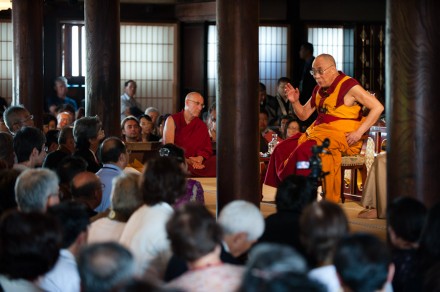
Nagano, Japan: His Holiness the Dalai Lama told a crowd of over 300 Japanese Buddhists that all human beings have the same potential to achieve Buddhahood if they realise the source of all sufferings is ignorance and delusion about one’s true nature.
“Awareness of one’s innate Buddha nature will give self-confidence and provide a key to happy life,” said His Holiness in his teaching of the Four Noble Truth today at Saihoji Temple in Nagano.
The teaching was part of an event organised by Saihoji Temple, where His Holiness consecrated a three-dimensional Mandala and a gilded statue of the Amitabha Buddha, both housed in a new Mandala Hall located on the temple compound. The walls of the new hall depict paintings of 8 Boddhisattavas and 30 auspicious symbols.
Eiichi Kaneko, the head priest of the temple said the inspiration for the new Mandala Hall came from the 300-yr-old Kangyo-Mandala Thangka, a treasured temple scroll depicting Buddhist heaven. In a statement issued today, he said the architecture of the Mandala and the Amitabha statue reflects the synthesis of Tibetan and Japanese Buddhism.
Tibetan Master Thangka painter and sculptor, Kalsang Lodoe Oshoe led a team of artisans to paint the walls of the Mandala Hall. Oshoe also used the lost Japanese art of using clay and washi (traditional Japanese paper) to construct the Buddha statue. The art of constructing clay and washi statues dates back to eighth century when the Nara period (710-794) in Japan was at its peak.
Oshoe belongs to a prominent family of Tibetan artisans and serves as an official court painter to the Dalai Lama. In the past, he has worked on projects at Smithsonian Museum in Washington DC, Springfield Museums in Massachusetts and other prestigious museums in the US and Europe.
–Report filed by Tsering Tsomo
